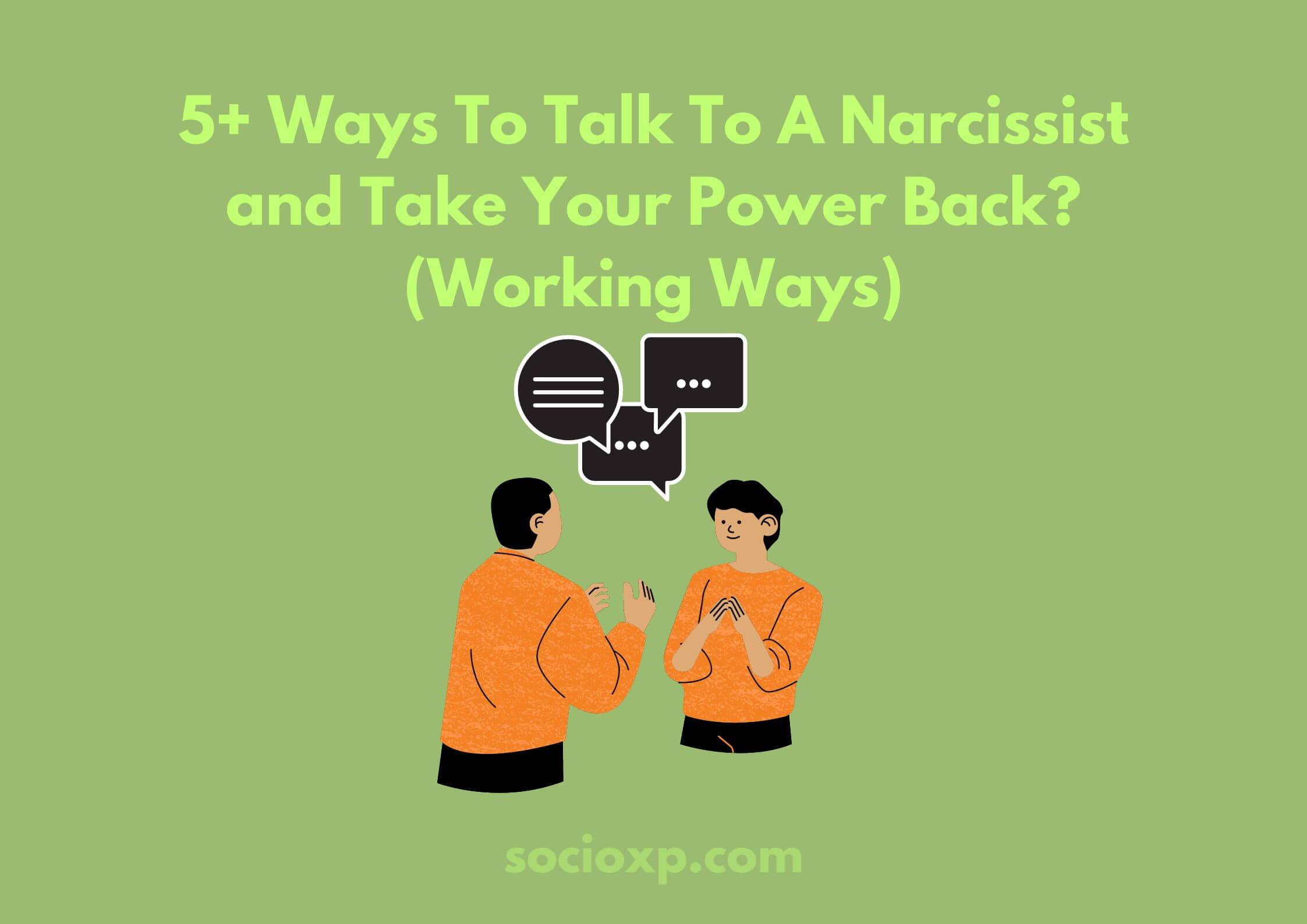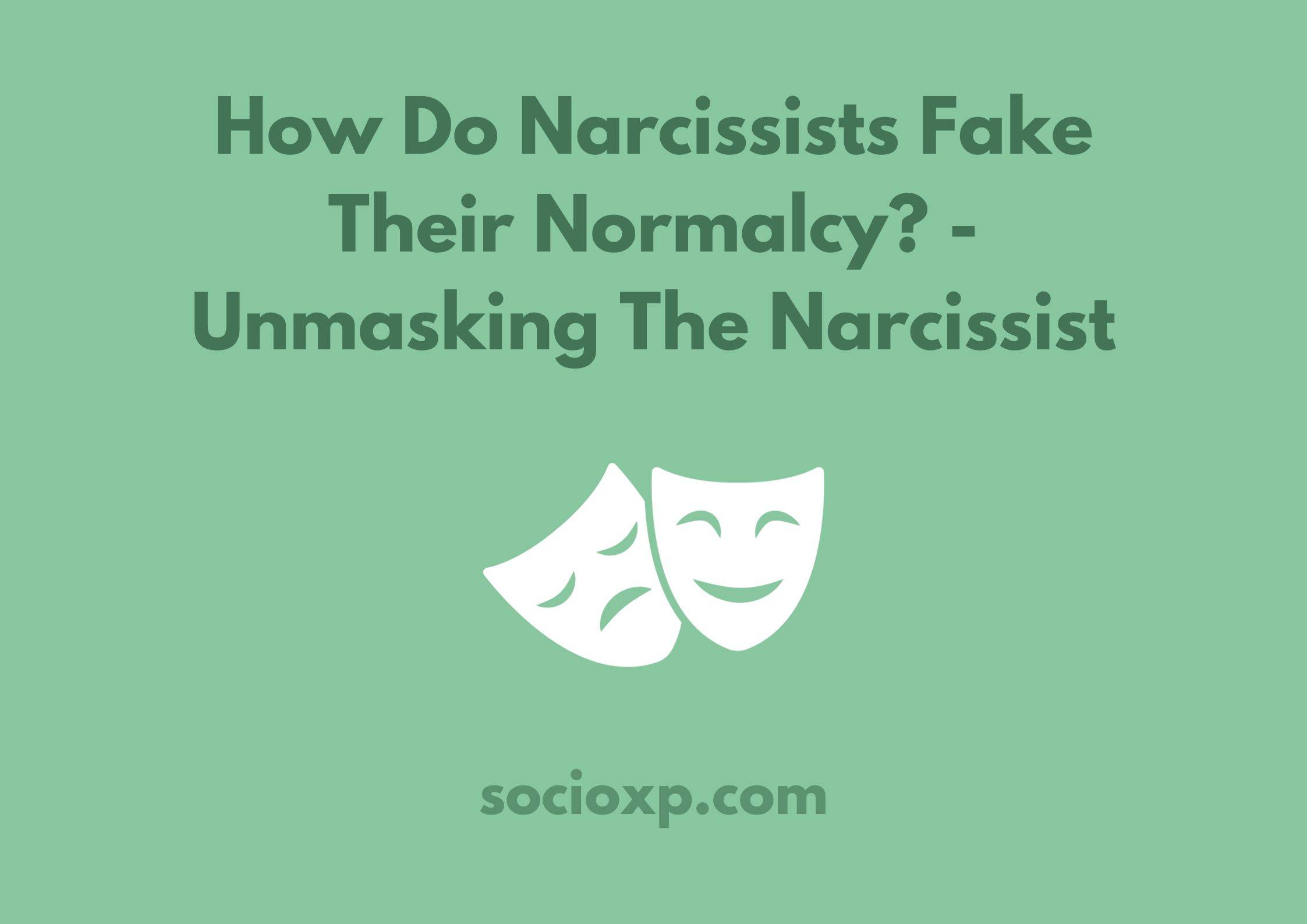How Do Narcissists Treat Their Moms? (Do They Love Their Them?)
How Do Narcissists Treat Their Moms? The relationship between a narcissist and their mother can significantly vary, but it is often characterized as an unhealthy relationship based on unhealthy attachments. Does narcissist treat their mothers the same way they treat others? Let us find out further in the article and know more about the structure of the relationship between a narcissist and their mother.

What is Narcissism? – How is a narcissist characterized?
Narcissism is a personality disorder, which is characterized by an exaggerated sense of self-importance, and a constant need for validation, admiration, and adoration. They lack one of the most important traits “empathy”, which can lead to many undesirable negative consequences for individuals like forming and maintaining healthy relationships with other people, an inability to understand other people’s feelings and emotions, mental health issues like anxiety and depression, social isolation, and in all an undesirable human being who might not be liked by others due to their such negative traits.
Anti-social behavior is usually not appreciated by society, whereas narcissists do not bother to merge among people comfortably. They have the urge to stand out, feel entitled or be the elephant in the room. They often exhibit exploitative behavior to achieve their goals and whatever they desire from other people. They view themselves as someone superior, smarter, attractive, desirable, and entitled than others which constantly makes them live with a fear of losing their power, image, recognition, and the fake personality facades that they create to prove themselves better than others.
Narcissism is an uncertain condition that can manifest itself in different forms, with varying degrees and consequences. In certain cases, narcissistic tendencies are perceived as a positive influence as powerful, smart, and influential as narcissists keep up a fake facade and always like to maintain a high-end image. But most of the time, narcissistic qualities are perceived as manipulative, destructive, cold, distant, and always causing emotional, psychological, and physical damage or harm to those around them.
Narcissists have the tendency to seek attention, admiration, and validation. They exploit others, seek advantage and use other people’s feelings to get what they desire. So the question arises do they even seek these from their mothers? or Do they exploit their mothers emotionally? The answer is a YES! Narcissists do not even spare their mothers. Narcissists seek attention, admiration, and validation even from their mothers throughout their life making their mothers a source of gaining their narcissistic supply.
Narcissists and their Mothers – How is the relationship between narcissistic children and their mothers?
It is essential to note that not all narcissists have the same relationship with their moms, some may have a good relationship with their moms and some may have a not-so-good relationship with their mothers because it totally depends on the bond between them. Some narcissists may show affection, love, and care towards their mothers, as they might have received the same from their mothers throughout. Some narcissists may treat their mothers with hostility and resentment as their mothers also might have not shown them the same or all they do care about themselves thus they might not consider reflecting something positive for their mothers.
In general, narcissists’ relationship with their mothers plays a significant role in the development and manifestation of their narcissistic tendencies and also their attachment to them. Therefore it becomes crucial to understand the nature of such relationships for getting a better insight into the sources, causes, or roots of some narcissistic traits.
For understanding the layers of the relationship between a narcissist and their mothers it becomes important here to note that this relationship is often complex, diversified, and with various subtleties at play.
Some psychology experts suggest that narcissism is either a result of an oppressive, dominating, and overbearing mother figure or a completely absent, not available, or missing mother figure. It is either the mother is too involved or interfering in their child’s life that causes the child to run for privacy and thus completely shuts down their emotions, or a completely ignorant mother who barely cares for their child that leads to a mean, manipulative and always trying and proving their worth kind of child. Both of these are not normal.
When the narcissistic child has an overbearing or overprotective mother
In the first case, where the mother is highly protective or overbearing the child may start feeling like the king or the queen of the house as they have always been given the desired or more amount of attention, always are papered with whatever they demanded, praised often, and scolded less. This way the child starts feelings special and hence starts feeling a sense of entitlement, all the pampering makes them feel that they are special and that everyone should be treating them in the same way, and the over-interference may be perceived as receiving extra attention all the time.
In this case, when the narcissistic child grows up to be an adult, they become less responsible regarding their duties as they are spoon-fed everything, they have all the attention in the world, a special treatment that makes them feel entitled. They may face trouble navigating the complexities of relationships outside the parent-child environment and thus struggle with empathy towards other people’s needs, feelings, and emotions and thus develop an underdeveloped or weaker bond.

When the narcissistic child has an ignorant or an entirely absent mother
On the other hand, looking at the second case, when a narcissistic child has an ignorant or entirely absent mother, the mother’s absence may force a child to seek other means of validation, attention, and adoration, which many a time lead to developing narcissistic tendencies as a coping mechanism. Here the child seems to always struggle hard to prove their worth as their mothers fail to provide them the required attention that a child needs while growing up. In this case, the child may resort to narcissistic traits to prove their worth and importance in the world, which may indulge them in utilizing manipulation, domination, and over-achieving individual.
When the narcissistic child has an ignorant or entirely absent mother, it can exacerbate their narcissistic tendencies. Without proper guidance from parents, the child may tend to develop an inflated sense of self and a lack of empathy toward others. In some cases the child may start depending on narcissistic traits as a coping mechanism against their harsh upbringing, leading to long-term behavioral and psychological issues. So when these children grow up to be adults, such children may also struggle with forming healthy relationships and have difficulty regulating their emotions. Overall an absent or ignorant mother can have a damaging impact on the development of a narcissistic child.
How Do Narcissists Treat Their Moms?
Narcissists have different ways of treating their mothers. It totally depends on the individual and their ways to pursue their emotions. Some narcissists may have a close and intense relationship with their mothers, but it is usually conditioned on their mothers meeting their needs, the adoration they provide, or how special they make their children feel. They may manipulate and control their mothers to preserve their sense of entitlement, admiration, and validation.
On the other hand, some narcissists may distance themselves from their mothers, abuse them emotionally, manipulate them for procuring their narcissistic supply, devalue them, or torment and blame them for their shortcomings due to which the narcissist might be lacking somewhere where they wish to succeed.
In the end, it ultimately depends on their personality, upbringing, and attachment style on how a narcissist treats their mother. It also determines their overall capacity for empathy, vulnerability, and love.

Do Narcissists Love Their Mothers?
Narcissistic parents leave a deep impact on their children, as they lack emotional bonds, their love is conditional, achievements are more important than their child, their needs are a top priority than their child’s, no arguments only agreements without knowing the problem, and much more. Narcissistic parents are almost emotionally unavailable, self-centered, and egoistic, lash out in anger more frequently, have a very low rate of understanding, and moreover blame the child, rather than looking at their own fault.
A narcissist or narcissist child does have the capability of feeling all emotions, it is just that they do not acknowledge them and express them due to their vulnerabilities. They fear expressing emotions can make them emotionally weak and vulnerable to their parent. They fear that once they surrender to their feelings they might face their parent’s rage. Narcissists are incapable of understanding and exchanging feelings with others. They are self-obsessed and self-absorbed. They can not think from anyone else’s viewpoint. As they do not know how to display their emotions they might struggle to showcase their emotions even to their parents just the same as their parents.
Narcissistic parents are unable to showcase any emotions in general, in the same way, their children might also struggle to reciprocate their feelings for them. Their children might even hesitate to display emotions at all. Narcissists or narcissistic children continuously fear real feelings, as they think they might lose their power and love can make them weak. Narcissists hate weakness as power, control, money, supply, and competency are all they love.
While it is common to assume that all mothers and their children share a bond of love, acceptance, and emotional connection, this may not be the case for all mothers. Similarly, it can be difficult to generalize if all narcissists love or do not love their mothers. A narcissist’s relationship with their mother can vary based on individual experiences, circumstances, and mental health.
A few signs narcissists show in their relationship with their mothers
It is common for children to have different types of relationships with their parents, including a narcissist’s relationship with their mother. Here are some signs that indicate a narcissist’s problematic or unhealthy relationship with their mothers.
Validation Seeking – A narcissist may seek validation for their actions or decisions from their mother, often to the point of placing unrealistic demands on her.
Exploitation – A narcissist may exploit their mother’s emotional or financial resources, often using them for personal gain without any regard for the mother’s well-being.
Control – A narcissist may use manipulation, domination, and oppression to control their mother’s behavior or decision-making power.
Indifference – A narcissist may exhibit callous or neglectful behavior towards their mother, showing little or no interest in their needs or feelings.
Guilt-Tripping – A narcissist may use guilt-tripping as a manipulative tool to control their mother’s behavior or to gain sympathy.
Grandiose Expectations – A narcissist may have grandiose expectations of their mother, often comparing them to an idealized image that they wish their mother was or had.
What can mothers do if their child becomes more narcissistic?
- A mother could be more understanding, caring, and compassionate toward their child.
- Exposing their child to more humanity; that is connect them with good people who can show them love and compassion.
- Being kind, and generous, and teaching them to be empathetic and loving towards their child will make a big difference.
- Be more open and discuss this matter thoroughly with the child.
What are some of the ways to cope with childhood trauma? – How to make yourself free from Narcissistic characteristics?

- Learning about your true feelings, keeping aside all the false facades that you have created, and acknowledging them can be the initial step.
- Excluding yourself from a group of narcissistic people and finding appropriate company in the form of friends, and a life partner can be one of the ways to keep yourself aloof from that atmosphere.
- Look after your physical health with the help of exercises, yoga, meditation, and any form of physical workout.
- Look after your mental health with the help of meditation, reading good books, seeking help from your loved ones, listening to music, and doing more things that keep your interest at its peak.
- Consult a mental health expert, a therapist, or anyone who can guide you on the correct path.
- Try connecting more with nature by hiking, swimming, jogging in the fresh air, and any possible means which can get you closure to nature.
- Give appropriate time to yourself to heal internally; do not force healing upon yourself.
- Find things that keep you away from negative thoughts, negative people, and a negative atmosphere.
- Learning new skills, meeting new people, and visiting new places also play a crucial role in freeing yourself from narcissistic characteristics.
In Conclusion
While it is common to assume that all mothers and their children share a bond of love, acceptance, and emotional connection, this may not be the case for all mothers. Similarly, it can be difficult to generalize if all narcissists love or do not love their mothers. A narcissist’s relationship with their mother can vary based on individual experiences, circumstances, and mental health.
A narcissist’s relationship with their mother can be complex and influenced by numerous factors, including childhood experiences, trauma, mental health, etc. In the end, it ultimately depends on their personality, upbringing, and attachment style on how a narcissist treats their mother. It also determines their overall capacity for empathy, vulnerability, and love.
- How does a Narcissist respond to No Contact?: 10 Plausible reactions - November 6, 2025
- The Inverted Narcissist: Traits that Describe Them - November 6, 2025
- What is an Empathetic Narcissist?: Meaning, Traits, and Ways to Cope with Them - November 4, 2025


